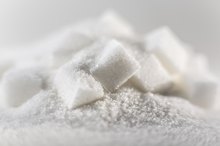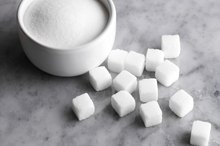Good Snack Before Bed for Low Blood Sugar
Snacking before bed is often said to be detrimental to your health, but a small bite to eat before hitting the hay can actually help stabilize your blood sugar levels while you sleep. Long periods of fasting -- like overnight -- can result in body processes that lead to suboptimal blood sugar levels.
Basic Physiology
The level of sugar in your blood is regulated by hormones -- primarily insulin and glucagon. Insulin’s job is to pull the sugar out of circulation in your blood and deposit it into your cells, which can then use it for energy. Glucagon’s job is to pull sugar out of your body’s stores when not enough is circulating in your blood to provide adequate fuel to your brain and muscles. If these hormones aren't working properly or if you run out of stored sugar and your blood sugar level falls under the normal range of 70 mg/dL you can experience symptoms of low blood sugar. Signs of low blood sugar include shakiness, dizziness, sweating, extreme hunger and sleepiness.
- The level of sugar in your blood is regulated by hormones -- primarily insulin and glucagon.
- Insulin’s job is to pull the sugar out of circulation in your blood and deposit it into your cells, which can then use it for energy.
The Somogyi Effect
How to Prevent Low Blood Sugar Over Night
Learn More
Sometimes people with diabetes experience the Somogyi effect, or rebound hyperglycemia. This occurs when the blood sugar dips too low – often in the middle of the night – and the glucagon hormone triggers a release of stored sugar to correct the low blood sugar. The result is a high blood sugar reading the following morning. Having a snack before bed can help keep the blood sugar from dipping too low during the night and provides a more desirable blood sugar level the next morning.
- Sometimes people with diabetes experience the Somogyi effect, or rebound hyperglycemia.
- Having a snack before bed can help keep the blood sugar from dipping too low during the night and provides a more desirable blood sugar level the next morning.
Carbohydrates
A good bedtime snack should contain carbohydrate. Carbohydrates are the preferred energy source for your brain and muscles. Including them in your snack is important for preventing low blood sugar. When selecting your carbohydrate source, avoid foods that contain refined sugar, like white granulated sugar, sucrose and high-fructose corn syrup. Also aim for a snack that's a good source of fiber, with at least 2.5 grams per serving.
- A good bedtime snack should contain carbohydrate.
- Including them in your snack is important for preventing low blood sugar.
Examples
Low Blood Sugar in the Morning
Learn More
Examples of good bedtime snacks to prevent low blood sugar include 1 cup of diced fresh pineapple with one-fourth cup no-salt-added low-fat cottage cheese, 1 cup of plain, no-salt-added popcorn with 11 dry roasted, unsalted almonds, one slice of 100-percent whole wheat bread with 1 tablespoon low-sodium almond butter, 1 cup of fresh strawberries with a half cup of plain, nonfat Greek yogurt, five low-sodium, 100-percent whole wheat crackers with 1 ounce of tuna canned in water or one boiled egg white with a medium banana.
Related Articles
References
- Endocrinology: An Integrated Approach; Nussey S et al.
- American Diabetes Association: Hypoglycemia (Low Blood Glucose)
- Diabetes Forecast: Handling Morning Highs in Blood Glucose
- Iowa State University Extension and Outreach: Carbohydrates
- Diabetes Spectrum: Protein Controversies in Diabetes: 2000
- American Diabetes Association: Carbohydrates
- Schönfeld P, Reiser G. Why does brain metabolism not favor burning of fatty acids to provide energy? Reflections on disadvantages of the use of free fatty acids as fuel for brain. J Cereb Blood Flow Metab. 2013;33(10):1493–1499. doi:10.1038/jcbfm.2013.128
- American Diabetes Association. Diabetic Ketoacidosis.
- American College of Emergency Physicians. Diabetic Emergencies.
- American Diabetes Association. Hyperglycemia (High Blood Glucose).
- American Diabetes Association. Hypoglycemia (Low Blood Glucose).
Writer Bio
Ashley Ritzo is a registered/licensed dietitian with a B.S. in dietetics from the University of Missouri. She also holds a certificate of training in adult weight management from the Academy of Nutrition and Dietetics. Ritzo has worked in inpatient and outpatient hospital settings, with community organizations and as a health and wellness coach.








